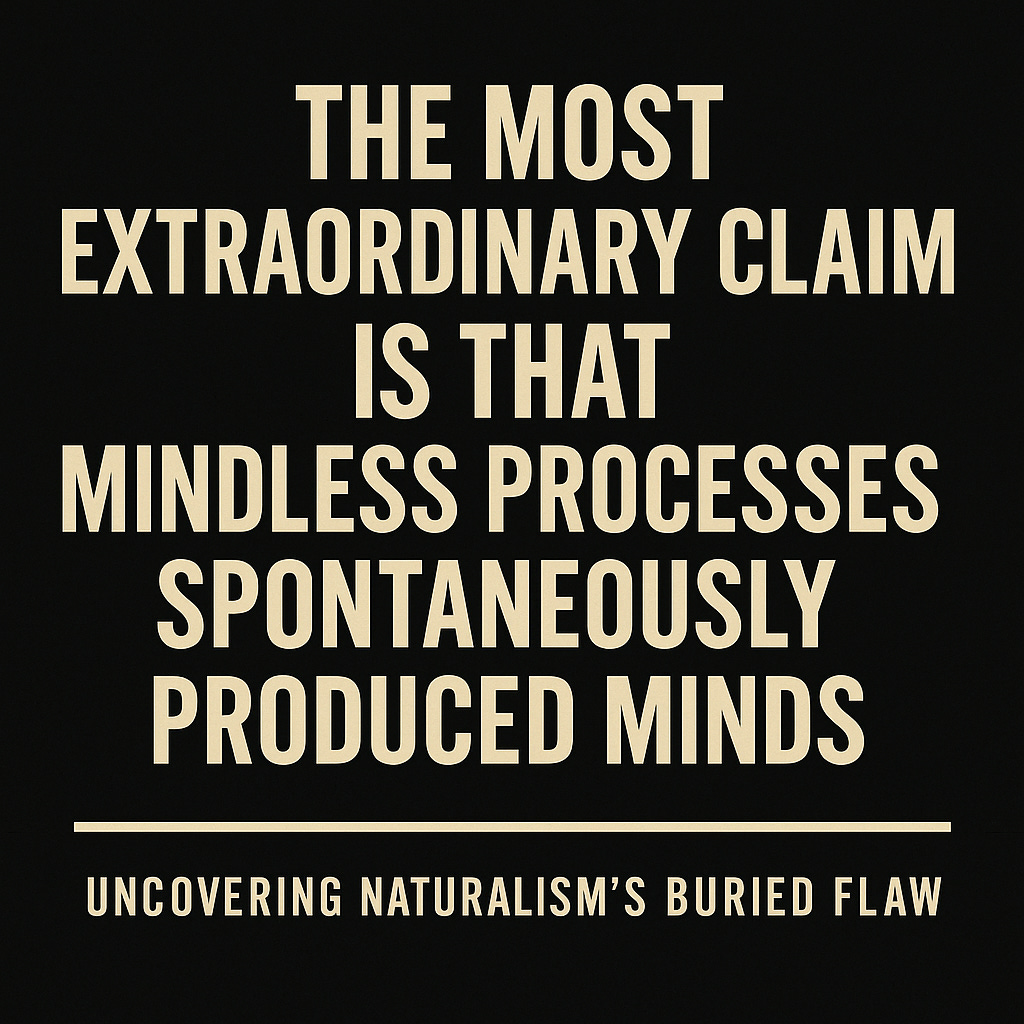Extraordinary Claims: Uncovering Naturalism’s Buried Flaw
The Atheist's Dilemma and the Christian Apologist's Opportunity
Atheistic naturalists love to say, “Extraordinary claims require extraordinary evidence.” They aim it at Christians as if it’s a checkmate line. But the most extraordinary claim on the table doesn’t belong to Christianity. It belongs to them.
Because naturalism insists that mindless, purposeless, non-rational processes produced rational minds. That’s the starting point for their entire worldview. Everything else is downstream.
And once you see the flaw buried in that assumption, their platform evaporates.
The Hidden Miracle in Naturalism
Let’s strip away the rhetoric.
Naturalism demands that:
Non-rational causes produce rational creatures
Blind processes generate truth-tracking reason
Chemical reactions create consciousness
Matter gives birth to meaning
Chaos gives rise to moral obligation
Every one of those is a logical category leap. They don’t just stretch probability; they shatter it.
Truth is simple: you can’t get what you don’t already have in the cause.
If the cause is mindless, the effect cannot be mindful. If the engine has no intentionality, you will never squeeze intentionality out of the exhaust. And if the origin is non-rational, then rationality is just an afterglow — an illusion.
Yet the naturalist trusts the product of those processes to evaluate the truth of those processes.
That isn’t science. That’s circular faith.
Reason Can’t Just Pop Out of Non-Reason
Imagine someone claiming language came from rocks banging together long enough. Or that mathematics emerged from ocean foam without any underlying structure. You’d call it nonsense immediately.
But swap those examples for “consciousness” and “rationality,” and suddenly the same claim gets dressed up as respectable.
Naturalism survives only by calling its own miracle “science.”
The Great Inconsistency
Here’s the pressure point.
If naturalism is true:
Your thoughts are nothing but chemical impulses
Your reasoning is just neural weather
Your convictions are accidents of biology
Your logic circuits evolved for survival, not truth
Which means the naturalist has no basis for trusting the very reasoning they use to defend naturalism.
The worldview refutes itself before it can finish a single argument.
It’s like standing on a branch while sawing it off at the trunk.
The Theist Isn’t the One Making the Extraordinary Claim
Theism says something straightforward:
Mind precedes matter. Reason precedes rationality. Intentionality precedes persons.
Order flows from an ordered source. Rationality comes from a rational cause. Conscious minds arise from the ultimate conscious mind.
That’s not extraordinary. That’s coherent.
Naturalism, on the other hand, asks you to believe that:
blindness gave birth to vision
meaninglessness produced meaning
non-life generated life
non-mind generated mind
non-reason generated reason
Those aren’t just extraordinary. They’re impossible.
The Real Extraordinary Claim Is Naturalism Itself
The moment a naturalist opens their mouth to argue, they borrow from a worldview their own worldview can’t supply.
They trust reason…
even though reason is, in their system, an evolutionary by-product with no grounding.
They use logic…
even though logic has no physical location, no mass, no energy, and no naturalistic explanation.
They make truth claims…
even though truth can’t fit inside a materialist ontology.
Naturalism must smuggle in what it cannot produce.
Theism doesn’t need to.
Theism grounds reason in the Logos — the eternal rational mind behind reality.
The Flaw That Ends the Debate
The naturalist demands “extraordinary evidence.”
Fine.
But they’ve already accepted the most extraordinary claim imaginable:
that mindless matter produced minds and we should trust them.
Once that falls, naturalism falls with it.
If you value reason, follow it to its source, not to its accidental by-product.
Naturalism ends in incoherence.
Christian theism begins with the very thing every worldview requires: a rational mind behind a rational world.
Soli Deo Gloria



We see minds come from natural processes every time an intelligent animal develops from conception. So that doesn't seem very extraordinary to me.
However, I will agree with you that the slogan "extraordinary claims require extraordinary evidence" is too vague to be helpful. In my opinion, it's better to look at individual cases. So, for instance, if Matthew claims that he saw a walking-and-talking risen Jesus, then I'm going to need more than just his word on that. John's too.
That's how I'd phrase it.